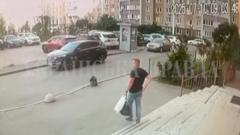The invitation has sparked fierce debates among officials and activists, reigniting tensions around artistic freedom and moral responsibility amid the ongoing war.
Italy Invites Controversial Conductor Valery Gergiev Amid Ongoing Ukraine War

Italy Invites Controversial Conductor Valery Gergiev Amid Ongoing Ukraine War
In a polarizing move, Italy invites pro-Kremlin conductor Valery Gergiev to perform, challenging European cultural sanctions.
Valery Gergiev, the renowned Russian conductor and long-time ally of President Vladimir Putin, is set to return to European stages in a groundbreaking move that defies ongoing bans against pro-Kremlin artists. Following Russia's full-scale invasion of Ukraine, Gergiev had been shunned by major European orchestras. However, the Campania region of southern Italy has extended an invitation for him to perform at the Un'Estate da RE festival later this month.
"This is a cultural event," asserted Vincenzo de Luca, the regional governor, during a livestream announcement. "Culture must not be influenced by politics." De Luca has previously expressed his disapproval of the widespread European ban on artists supporting Putin as a “moment of stupidity.” Proudly welcoming Gergiev, he emphasized the separation of culture from political agendas.
Vice-President of the European Parliament, Pina Picierno, sharply criticized the decision, calling Gergiev a “cultural mouthpiece for Putin and his crimes.” She expressed disappointment that Italy would host an artist who remains silent on the war and stressed that allowing Gergiev to perform sends a troubling message amid ongoing conflicts.
Counteracting de Luca’s assertion of neutrality, Ukrainian human rights activist Oleksandra Matviichuk called the invitation “hypocrisy.” Additionally, the Anti-Corruption Foundation, founded by the late opposition leader Alexei Navalny, demanded the cancellation of Gergiev's concert and urged Italy's interior ministry to bar his entry, deeming the move unacceptable.
Previously a fixture on the European classical music scene, Gergiev's career was disrupted on February 24, 2022, coinciding with the Russian invasion of Ukraine. Days before the war began, he performed at Milan's La Scala, where he was pressured to denounce the conflict but opted for silence, leading to his dismissal from multiple orchestras.
The return of Gergiev to Italy ignites controversy in a week where Italian leaders reaffirmed their support for Ukraine. Prime Minister Giorgia Meloni has been a vocal opponent of Putin, yet her culture ministry backs the Un'Estate da RE festival. Supporters of Gergiev argue that penalizing artists for their government’s actions constitutes a form of cultural genocide, while critics argue that this represents a calculated move to destabilize Western public opinion.
While Gergiev has not publicly commented on the situation, he has been subjected to scrutiny over his ties to the Kremlin. Following the war’s outbreak, Canada formally barred him from entry, yet the European Union has not enacted similar sanctions, leaving the conductor unchallenged despite his history of supporting Putin.
As conflicting views circulate within European politics and society, Gergiev’s upcoming concert remains a focal point of contention regarding the intersection of culture and international conflict. The festival organizers seem determined to proceed with the performance, further complicating the cultural landscape in a time of crisis.
"This is a cultural event," asserted Vincenzo de Luca, the regional governor, during a livestream announcement. "Culture must not be influenced by politics." De Luca has previously expressed his disapproval of the widespread European ban on artists supporting Putin as a “moment of stupidity.” Proudly welcoming Gergiev, he emphasized the separation of culture from political agendas.
Vice-President of the European Parliament, Pina Picierno, sharply criticized the decision, calling Gergiev a “cultural mouthpiece for Putin and his crimes.” She expressed disappointment that Italy would host an artist who remains silent on the war and stressed that allowing Gergiev to perform sends a troubling message amid ongoing conflicts.
Counteracting de Luca’s assertion of neutrality, Ukrainian human rights activist Oleksandra Matviichuk called the invitation “hypocrisy.” Additionally, the Anti-Corruption Foundation, founded by the late opposition leader Alexei Navalny, demanded the cancellation of Gergiev's concert and urged Italy's interior ministry to bar his entry, deeming the move unacceptable.
Previously a fixture on the European classical music scene, Gergiev's career was disrupted on February 24, 2022, coinciding with the Russian invasion of Ukraine. Days before the war began, he performed at Milan's La Scala, where he was pressured to denounce the conflict but opted for silence, leading to his dismissal from multiple orchestras.
The return of Gergiev to Italy ignites controversy in a week where Italian leaders reaffirmed their support for Ukraine. Prime Minister Giorgia Meloni has been a vocal opponent of Putin, yet her culture ministry backs the Un'Estate da RE festival. Supporters of Gergiev argue that penalizing artists for their government’s actions constitutes a form of cultural genocide, while critics argue that this represents a calculated move to destabilize Western public opinion.
While Gergiev has not publicly commented on the situation, he has been subjected to scrutiny over his ties to the Kremlin. Following the war’s outbreak, Canada formally barred him from entry, yet the European Union has not enacted similar sanctions, leaving the conductor unchallenged despite his history of supporting Putin.
As conflicting views circulate within European politics and society, Gergiev’s upcoming concert remains a focal point of contention regarding the intersection of culture and international conflict. The festival organizers seem determined to proceed with the performance, further complicating the cultural landscape in a time of crisis.






















